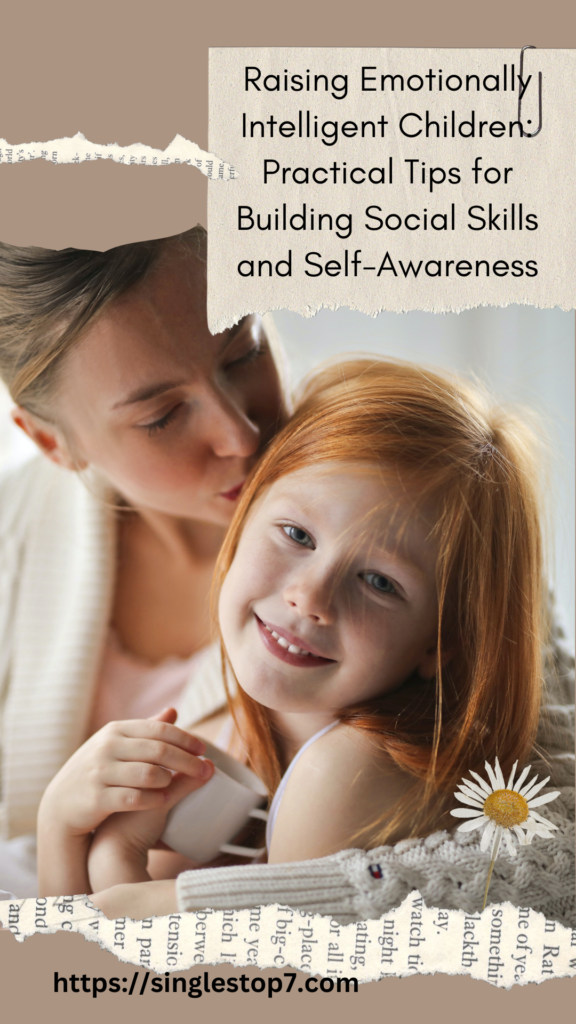Raising Emotionally Intelligent Children: Practical Tips for Building Social Skills and Self-Awareness
Do you remember the last time your child had a temper tantrum or an emotional breakdown? Maybe it was over something as simple as not getting their favorite snack, or something more complex like struggling with schoolwork. In these moments, it’s easy to feel frustrated, overwhelmed, or unsure of how to handle the situation. But what if there was a way to equip our children with the skills to better manage their emotions and navigate these challenging moments?
That’s where emotional intelligence comes in. Emotional intelligence is the ability to identify, understand, and manage one’s own emotions, as well as the emotions of others. In other words, it’s the ability to recognize when we’re feeling a certain way, understand why we’re feeling that way, and then use that information to make constructive choices about how we behave and interact with others.
Now imagine a scenario where your child is upset about something. Rather than throwing a tantrum or shutting down, they’re able to express their feelings in a healthy way and work through the problem. Or imagine a situation where your child is interacting with others, such as making friends or resolving a conflict. With emotional intelligence, they’ll be better equipped to understand and communicate their own feelings, as well as pick up on the emotions of others.
As a parent, it can be easy to get caught up in the day-to-day tasks of raising a child. But when we take a step back and focus on the bigger picture, we realize that helping our children develop emotional intelligence is essential to their long-term success and happiness. So let’s explore what emotional intelligence is, why it’s important, and practical strategies for fostering emotional intelligence in our children. Together, we can help our children develop the skills they need to navigate life’s challenges and build a bright future.
What is Emotional Intelligence and Why is it Important?
Emotional intelligence refers to the ability to recognize, understand, and manage one’s own emotions, as well as the emotions of others. This skillset encompasses a range of abilities, including self-awareness, self-regulation, empathy, and social skills. In today’s complex world, emotional intelligence has become increasingly important as a tool for navigating relationships, managing stress, and achieving personal and professional success.
One of the key benefits of emotional intelligence is that it enables individuals to better manage their own emotions. For example, a child who has developed emotional intelligence skills will be able to recognize when they are feeling angry, sad, or frustrated and understand why they are feeling that way. This awareness can help them regulate their emotions more effectively and make better decisions about how to behave in a given situation.
Additionally, emotional intelligence enables individuals to better understand the emotions of others. This skillset is particularly important when it comes to building strong relationships and resolving conflicts. For example, a child who is able to pick up on the emotions of a friend who is feeling sad or upset can offer support and comfort, which can strengthen the bond between them.

Practical Strategies for Fostering Emotional Intelligence in Children
Predicting Emotions
One important aspect of emotional intelligence is the ability to predict how others might be feeling based on their body language, facial expressions, and tone of voice. This is a skill that children can develop with practice. Here are some ways to help children learn how to predict emotions:
Play emotions charades: Take turns acting out different emotions, such as happiness, sadness, anger, or surprise, and have your child guess what emotion you are portraying.
Read books together: Choose books that explore different emotions and talk about how the characters might be feeling based on their actions and expressions.
Use visual aids: Use pictures or drawings of different facial expressions and body language to help your child learn how to recognize and predict different emotions.
Developing Emotional Intelligence
Once children have learned to recognize and predict emotions, there are several strategies that can be used to help them develop their emotional intelligence:
Talk about emotions: Encourage your child to talk about their emotions and listen attentively to what they have to say. Validate their feelings and help them find ways to express their emotions in a healthy and constructive way.
Practice self-regulation: Help your child develop strategies for managing their own emotions, such as taking deep breaths, counting to ten, or taking a break to calm down.
Encourage empathy: Teach your child to put themselves in someone else’s shoes and think about how they might be feeling in a given situation. Help them practice active listening and offer support and comfort to others when they are upset.
Help your child develop self-awareness
Self-awareness is a critical component of emotional intelligence. Encourage your child to reflect on their emotions and identify what they are feeling. If your child is upset about something, ask them to describe what they are feeling and why. This can help them better understand their emotions and develop strategies for managing them.
For example, if your child is feeling anxious about a test, ask them to describe what they are feeling and why. Help them come up with strategies for managing their anxiety, such as taking deep breaths, using positive self-talk, or visualizing success.
Model emotional intelligence
Children learn by watching and imitating the behavior of adults. So, make sure you are modeling emotional intelligence in your own interactions with others. If you’re feeling frustrated, talk to your child about what you’re feeling and how you’re managing it. This can help your child learn how to recognize and manage their own emotions.
Example: If you’re feeling frustrated because of traffic, talk to your child about what you’re feeling and why. Model strategies for managing frustration, such as taking deep breaths or listening to music.
Teach your child empathy
Empathy is the ability to understand and share the feelings of others. Encourage your child to think about the feelings of others and consider how their own actions might impact those around them. If your child is having a disagreement with a friend, ask them to consider how their words and actions might make the other person feel. This can help your child develop more positive and supportive relationships.
Example: If your child’s friend is upset because they didn’t do well on a test, encourage your child to empathize with their friend and offer words of encouragement or support.
Foster positive relationships
Strong relationships are essential to emotional intelligence. Encourage your child to develop positive relationships with family members, friends, and other adults in their life. If your child is having trouble making friends, help them find activities or clubs where they can meet like-minded children. This can help your child develop social skills and build strong, supportive relationships.
Example: If your child is interested in playing soccer, help them find a local soccer league where they can meet other children with similar interests and build friendships.
Provide opportunities for social interaction
Social interaction is key to developing emotional intelligence. Encourage your child to participate in group activities, such as sports teams or clubs, where they can practice social skills and learn how to work effectively with others. This can help your child develop communication skills, empathy, and teamwork.
Example: Encourage your child to join a school club or volunteer group where they can meet new people and practice social skills. This can help your child feel more confident and comfortable in social situations.
As parents, we all want our children to lead happy and fulfilling lives, and emotional intelligence is a crucial factor in achieving this goal. By fostering emotional intelligence in your child, you are equipping them with the skills they need to navigate life’s ups and downs successfully. You are giving them the power to connect with others, empathize with those around them, and manage their emotions in a healthy way. As you guide your child through the journey of emotional intelligence, you are setting them up for a future filled with meaningful relationships, academic and social success, and a sense of purpose and fulfillment. So, let’s take this responsibility seriously, and work together to empower our children with the gift of emotional intelligence. The rewards are immeasurable, and the impact will be felt for generations to come.








